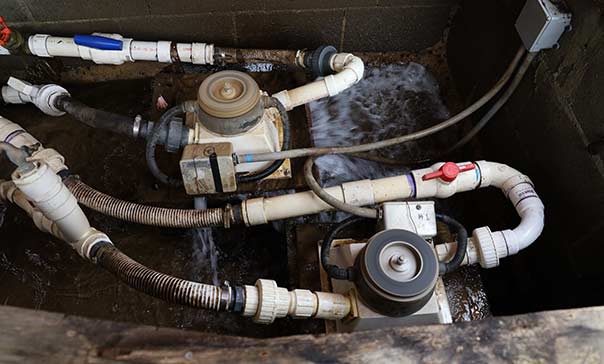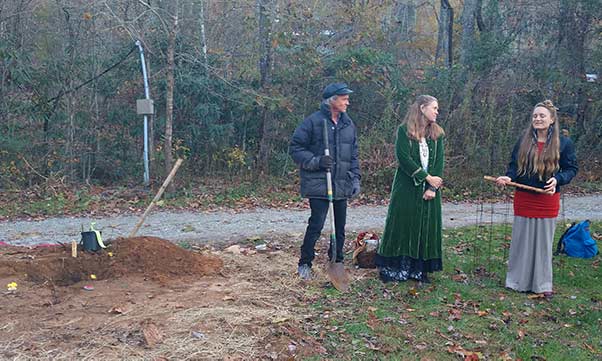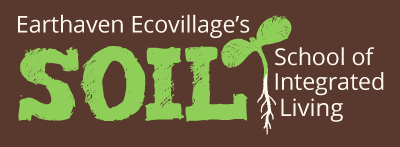What is SOIL?
Welcome! If you’re landing on this page, you may be curious to hear about the School of Integrated Living – affectionately known as SOIL – in more depth. This article introduces the school, and some of the most important concepts, issues, and subjects we address in our offerings.
Are you…
Concerned for human beings and the Earth, and looking for skills to live more sustainably?
Longing for more community and connection around what matters most, and wondering if SOIL may meet that need?
Curious to learn more about SOIL and the regenerative future we envision and practice towards?
Considered attending a SOIL program for a while but are on the fence?
Wanting to understand how our educational offerings pertain to your personal life vision?

SOIL Overview
School of Integrated Living (SOIL) is a radical experiential education project that exists to teach whole-life skills for a radically different and sustainable future. We bring together an experienced team of unconventional leaders to provide classes that holistically transform our students’ lives and equip them to serve their communities. These experiences range from weekend explorations of a specific skill to long-term immersions in the practice of Earthaven’s sustainable culture. All of our programs promise to teach whole-life skills that deepen into embodied knowledge.

SOIL hosts hands-on, skill-building programs and classes from its campus at Earthaven Ecovillage, an intentional community located in the Southern Appalachians near Asheville, North Carolina. The School of Integrated Living was created by co-founders NikiAnne Feinberg and Lee Warren in 2013. As educators and community members at Earthaven, Lee and NikiAnne recognized the incredible, unique, wealth of knowledge being practiced day-to-day Earthaven; the village is home to a collective of seasoned homesteaders, ecological and social permaculturists, designers of regenerative systems, animal stewards, natural builders, traditional craftspeople of all stripes, forest homeschoolers, herbalists, wild food foragers, conscious communicators, mind-body healers, and more.
Lee and NikiAnne realized that the abundant skill and knowledge stewarded by individuals in the community, as well as the shared collective learnings of the Earthaven experiment itself, have much to offer the world as it meets this time of ‘great turning.’ [link to deep ecology/TWTR]. SOIL serves as the bridge between skills and practices concentrated here on Earthaven land, along with our wider network of teachers, to anyone who wishes to receive these teachings. In a world on the brink of collapse, SOIL was founded as a living ‘seed-bank’ of regenerative and life-honoring skills to see us through this time of transition and the troubles ahead of us.
In late 2020, SOIL merged with another Earthaven-based educational group – Culture’s Edge, a 501(c)3 non-profit corporation. With a good amount of overlap in staff & instructors, similar missions, both being based in Earthaven, and ambitious new initiatives brewing… it became clear that joining forces would provide great benefits.
.
What We Believe & Why We Educate
We find ourselves alive in an extraordinary time; a time of uncertainty and disconnection, but also a time of great possibility where cooperation, courageous action, and collective movement can cultivate the more beautiful world we’re longing to live in. In these times of ecological, political, and social catastrophe looming on the horizon, it is essential that we dig deep to find our creative will and power to help life jump up and live. In these interesting times, the Earth is asking us to stay passionate, get creative, search for and implement solutions. We must answer this call to truly make a difference for a time beyond our own.
The complex nature of the climate crisis calls for courageous action and holistic solutions. Those which weave together social, ecological, economic, political, spiritual, and scientific dynamics. Luckily for us, there is ancient wisdom stored in our bodies and in the ecosystems that surround us. And we can learn from many solution-oriented spiritual teachings from across cultures.
Our sacred work of rising up to meet the challenge of the climate crisis begs us to problem-solve from a seat of wellness and holistic understanding. As humans we will only protect and care for what we love. Thus, the first step in becoming a truly engaged and effective earth activist is to fall in love with the world. We must be in intimate relationship with the land we live on, the food that feeds us, and the waters we drink and bathe in. This course correction also requires us to pursue our heart projects, and connect deeply with the people we share this beautiful world with.

Mission & Vision
SOIL’s mission is to inspire and empower people to live responsible and creative lives by providing experiential education in integrated living and regenerative systems. SOIL envisions a world where self-reliant, interdependent, and nature-connected people are deeply engaged in their local and global communities.
SOIL envisions that these passionate people make informed and responsible choices for their basic needs (food, shelter, water, medicines), understand their impact on the world, forge real connection with themselves and others, and ultimately contribute to a more sustainable and just world for all.
We believe that sustainability and life-skill education is crucial for a planet in peril, economic collapse, and social fragmentation. Our philosophy of service learning successfully complements traditional academic learning environments. Hands-on study allows our students to create an authentic connection between what they learn academically and what occurs in the world, enhancing critical thinking and teamwork skills.
Our graduates gain whole-life skills that deepen into embodied knowledge, which they then integrate into daily lived experiences. We populate the world with empowered, skilled, and conscious leaders dedicated to creating radical, regenerative change and healthy reciprocal relationships.
Embracing life-as-classroom, and taking a deeply holistic and integrative approach to education, our curriculum continues to evolve. In addition to the annual programs that form our kernel, we continue to vary and expand our offerings by bringing in experts in various important areas of skill-building each season.
We have something to offer everyone, whether you are a repeat student and engage all subjects, or you attend a customized program created specifically for your group.
No matter which SOIL program you choose to attend, you can expect to be asked to apply what you are learning both deeply and widely, understanding how the specific skills you are honing in a course can be understood holistically and applied in other dimensions of life.
In the past, we have taught classes on:
- Permaculture Design
- Eco-Spirituality and Deep Ecology
- Immersions in Village Living
- Death Midwifery & Grief Tending Skills
- Compassionate Communication (NVC and more)
- Nature-Based Pedagogies for Mentoring and Teaching Children
- Renewable Energy
- Shoemaking and other Traditional Crafts
- Village Building: Regenerative Community Systems & Structures
- Authentic, Nature-Connected Leadership
- Food as Medicine
- Natural Building and Eco-Conscious Design
- Empowered Activism
- Sustainable Land Stewardship
Experiential Education
SOIL recognizes that over time, North American and Eurocentric cultures have moved towards an exclusively mental and conceptual lens on learning. We typically only recognize “top down” ways of knowing, and even behave as though we have a collective addiction to accumulating knowledge.
Although there are some things that academic and traditional educational pedagogies do well, the way they ask us to learn tends to train us to ‘know’ by memorizing and accumulating. We believe that for education to be effective, it needs to address all parts of the human being; our bodies, our intellects, and our spirits.
SOIL views education as a social learning activity. We believe that most participants thrive best with a blend of formal and informal study, experiences and practice, and time for both absorption and integration. SOIL’s curriculum is powerful and engaging because it focuses on the interplay between the visible and invisible worlds, forging connections between “our inner ecology and outer ecology.”
We also know from experience that human beings learn best through immersion in experience. We particularly value skill-building because we intend to empower people with experiences that can become applied knowledge ; translating knowledge to inspired action and creative service on behalf of social and earth justice. Just being on the land — in practical and subtle ways — is important learning through embodied presence.
Another important component of our curriculum is service-learning ; practicing the skills and models of thinking alongside folks’ who live and work in our eco-village classroom. Through our various program focuses, we empower our students to exercise these necessary skills in their own communities and homes.
What is Integrated Living?
The condition of our current world has been described, among many other names, as an old story of separation. This narrative has left, as its legacy, a world of fractured lives and minds. We are witnessing are witnessing an epidemic of disconnection which runs deeply through our collective memories and drives the life-dishonoring systems from the lands we live on, from our sources of sustenance of all kinds, separation from ancestors, separation from each other through legacies of oppressive social factions, through the nuclear family structure, separation of mind and body, and through the myth of the individual.
This story of separation and mechanization is the worldview that grips the dominant culture, beginning with the colonialism and industrialization of our world. We are witnessing the destruction of the earth, and the mass extinction of thousands of species, possibly including human beings, as a result of what this story has allowed us to do to the planet.
What might it look like to practice something else? We might call that ‘integration:’ the understanding that — like strands of mycelium — everything is connected, everything counts, that our personal wellbeing is a holographic reflection of the totality or collective. Integrated living recognizes and tends simultaneously to our inner and outer ecologies.
For example: Permaculture, as a body of knowledge, is a cornerstone of SOIL’s educational philosophy. While permaculture is primarily known for its land-stewarding techniques, its regenerative principles actually speak to any kind of living system, and have successfully carried over to principles of designing and tending to social landscapes. ‘Integrated Living’ is a practice of embodying regenerative principles in a way that considers every dimension of life with equal importance.
Such ideas might seem ‘spiritual,’ or ‘esoteric,’ and while we affirm that dimension of exploration, we urge our students to understand that ‘interbeing’ is eminently practical, and must be addressed in the most foundational areas of our lives: Do we know where is our water coming from, or know our local watersheds and waterways? Where does our food grow, and how was it raised? How are we reaching across differences to form resilient connections with our closest neighbors?
If we are to survive and overcome the social and economic crises of our time, we will all be required to deeply adapt our fundamental ways of life, re-learning the skills our ancestors possessed that enabled their survival for millennia, and approaching the troubles of our time with great creativity, ingenuity, and collaborative spirit.
About Earthaven
We value hosting students at our Earthaven Campus because it is a living laboratory for the practice of ‘integrated living.’ Founded in 1994, Earthaven Ecovillage is located on 329 acres in culturally rich, biologically diverse western North Carolina, about 50 minutes southeast of Asheville and 30 minutes southeast of Black Mountain.
Home to approximately 100 residents, the community is dedicated to caring for people and the Earth by learning and demonstrating a holistic, sustainable culture. The springs and creeks that traverse the land help welcome and invite you into the flow of what is happening in this serene forested setting.
The Ecovillage Concept
“Ecovillages are human-scale, full-featured settlements in which human activities are harmlessly integrated into the natural world in a way that is supportive of healthy human development, and which can be successfully continued into the indefinite future.”
—Robert and Diane Gilman
Ecovillages and Sustainable Communities, 1991
As defined on the Global Ecovillage Network site (GEN): An ecovillage is a community which uses local participatory processes to holistically integrate ecological, economic, social, and cultural dimensions of sustainability in order to regenerate social and natural environments.
Earthaven’s mission is to create “a living laboratory and educational seed bank for a sustainable human future.” Earthaven members seek to become empowered, responsible, ecologically literate citizens, modeling a bioregionally appropriate culture and valuing sustainable ecological systems, permaculture design, elegant simplicity, right livelihood, and healthy social relations.
Off-Grid Living
Staying and learning at Earthaven is an adventure! Earthaven is off-the-grid, which means it is not tied into public electricity or water systems – we create them ourselves. We derive our electricity from hydro (water) power, solar (sun) power, or a gasoline-powered generator, and our water from on-land springs and wells.
Day-to-day life in the village is a deep cooperation to create our sustainable living systems, holding a delicate ecology of shared responsibilities and private freedoms while practicing consensus decision making. We practice relating across differences with people of all ages, living and dying well, and honorable relationships to our bioregion and world, the spirit of the land.
Vision for a Regenerative Future
An inspirational statement written by a small group of members during Earthaven’s 2008 strategic planning retreat envisioned that “Earthaven is a living seed in which we store the best of our cultural heritage, and an incubator in which we will embrace our responsibility as humans during the impending chaos. We will pass our mythology, technology, and community skills on to our extraordinary descendants, who will plant a polyculture of survival strategies and help cultivate a sustainable renaissance. Through cultural exchange between tribes, they will create a world more abundant, beautiful, and peaceful than ours. The success of our efforts today shall be measured in these terms.”
